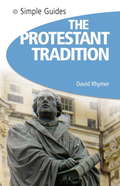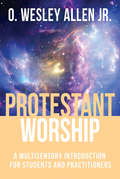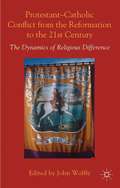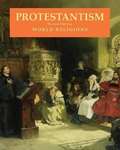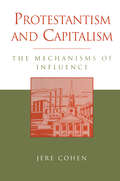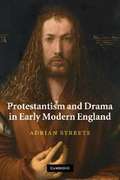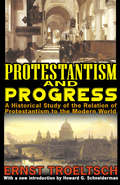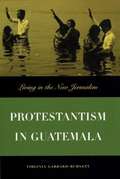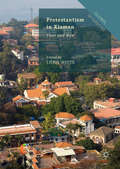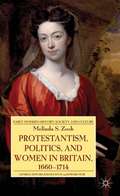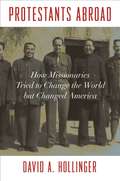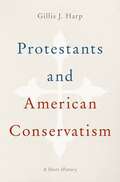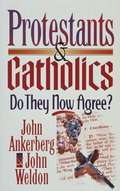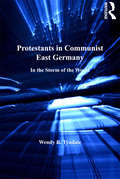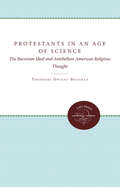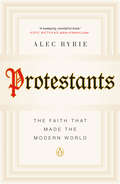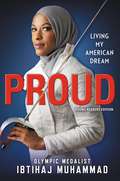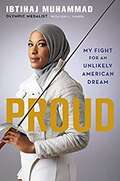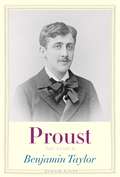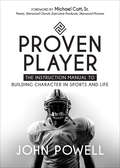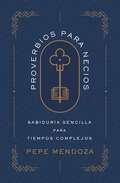- Table View
- List View
Protestant Tradition - Simple Guides
by David RhymerTHIS BOOK WILL HELP YOU* to discover how Protestantism developed and spread from Europe to America* to appreciate the wide range of interpretations of Protestantism, and the core beliefs and practices shared by the principal Protestant Churches* to understand the special history of the Church of England* to gain a perspective on the evangelical movements of the twenty-first centuryACCESS THE WORLD'S RELIGIONSSimple Guides: Religion is a series of concise, accessible introductions to the world's major religions. Written by experts in the field, they offer an engaging and sympathetic description of the key concepts, beliefs and practices of different faiths.Ideal for spiritual seekers and travellers alike, Simple Guides aims to open the doors of perception. Together the books provide a reliable compass to the world's great spiritual traditions, and a point of reference for further exploration and discovery. By offering essential insights into the core values, customs and beliefs of differentsocieties, they also enable visitors to be aware of the cultural sensibilities of their hosts, and to behave in a way that fosters mutual respect and understanding.
Protestant Worship: A Multisensory Introduction for Students and Practitioners
by O. Wesley Allen Jr.Students and leaders of worship strive to plan and lead worship well, in all sorts of circumstances. They and their fellow worshippers seek to experience a deep connection with God and with each other. In some ways, worship is about just that: connection. Protestant Worship: A Multisensory Introduction for Students and Practitioners teaches and actually demonstrates how the actions, reactions, outpourings and responses of a worship service are all part of a powerfully interwoven and ever-evolving whole. Author Wes Allen uses the analogy of physics--with its concepts of the big bang, time, space, matter, energy and chaos--to teach beginning and practicing worship leaders the fundamentals of Protestant worship. The enhanced e-book version offers photos, graphics and even videos demonstrating the book’s key content. Readers can immediately see examples of infant baptism in a contemporary service, for instance. Readers will gain understanding and build skill, to lead worship well. Many worship textbooks are written from a high liturgical perspective, weighted toward historical tradition; this approach often seems irrelevant for students and worship designers who will be planning and leading worship in the evolving twenty-first century church. Other books lean toward the most basic "how-to", emphasizing contemporary and practical aspects of worship leadership, but offering little historical or theological foundation beyond scripture. Protestant Worship provides a rich and deep foundation, and practical and immediately useful instruction.
Protestant, Catholic, Jew: An Essay in American Religious Sociology
by Will Herberg"The most honored discussion of American religion in mid-twentieth century times is Will Herberg's Protestant-Catholic-Jew. . . . [It] spoke precisely to the mid-century condition and speaks in still applicable ways to the American condition and, at its best, the human condition." --Martin E. Marty, from the Introduction"In Protestant-Catholic-Jew Will Herberg has written the most fascinating essay on the religious sociology of America that has appeared in decades. He has digested all the relevant historical, sociological and other analytical studies, but the product is no mere summary of previous findings. He has made these findings the basis of a new and creative approach to the American scene. It throws as much light on American society as a whole as it does on the peculiarly religious aspects of American life. Mr. Herberg . . . illumines many facets of the American reality, and each chapter presents surprising, and yet very compelling, theses about the religious life of this country. Of all these perhaps the most telling is his thesis that America is not so much a melting pot as three fairly separate melting pots." --Reinhold Niebuhr, New Yorks Times Book Review
Protestant-Catholic Conflict from the Reformation to the 21st Century: The Dynamics of Religious Difference
by John WolffeTaking a fresh look at the roots and implications of the enduring major historic fissure in Western Christianity, this book presents new insights into the historical dynamics of Protestant-Catholic conflict while illuminating present-day contexts and suggesting comparisons for approaching other entrenched conflicts in which religion is implicated.
Protestantism (2nd edition)
by Stephen F. BrownProtestantism, Second Edition explores the origins, customs, and history of Protestantism, from its beginnings in the Middle Ages to its role in today's world. Current issues, such as the development of new religious denominations, abortion, the ordination of gays and women, and the relationship between religion and politics, are explored within the framework of the fundamental moral tenets of the faith. This volume also examines the political diversity among people of the Protestant faith. All material has been updated, revised, and expanded to reflect the most current information on this religion, including new photographs and rewritten chapters. Coverage includes: *Introduction to the Protestant world *The origins of Protestantism *The history of Protestantism *Branches of Protestantism and their basic beliefs *Rites of passage *The impact of Protestantism *Protestantism facing new challenges.
Protestantism and Capitalism: The Mechanisms of Influence (Sociology & Economics Series)
by Jere CohenArguably, the most important single work in classical sociology is Max Weber's thesis on how Protestantism makes its impact on capitalism. Cohen's argument is that Protestantism affects capitalism in several different ways. Each is linked as a separate mechanism of influence, and may therefore be assessed separately. Weber himself stated or suggested several possible mechanisms of influence. Protestantism gave the spirit of capitalism its duty to profit and thus helped to legitimate capitalism. Its religious asceticism also produced personalities well-suited for work discipline. Finally, the new turn in Christian doctrine contributed to the quest to prove one's salvation, because God's favor could be shown through business success.Cohen's argument is that some of these processes worked as Weber indicated and others did not. This makes a blanket assessment of his famous thesis inappropriate. The Weber thesis has been difficult to prove or disprove because the refutation of some suggested mechanisms still leaves others viable. Only a comprehensive testing of all of Weber's sub-hypotheses can provide a proper assessment of his work. By simultaneously examining these sub-texts, the author pulls together Weber's arguments and points of criticism. The book juxtaposes historical evidence pro and con.Cohen revisits, reexamines, and tests the classic Weberian thesis that the beliefs and presuppositions of the English Puritans, rather than the forces of economic determinism, ushered in the era of modern capitalism. He divides Weber's single argument into two main mechanisms of influence: one behavioral, confined to which Puritan tenets in particular affected a believer's economic activity; the other, a more prevalent and far-reaching cultural mechanism, which became part of the mainstream. By taking advantage of present day information, including recently discovered diaries of two seventeenth-century Puritan merchants, Cohen's text sums up many years of argument in the journal literature. The book will find a place in a wide range of courses, from sociology of religion, sociological theory, social economics, political science, to European history.Jere Cohen, a sociologist at the University of Maryland in Baltimore County, is the author of numerous journal articles, many of them also dealing with Max Weber and his Protestant Ethic thesis.
Protestantism and Drama in Early Modern England
by Adrian StreeteContaining detailed readings of plays by Shakespeare, Marlowe and Middleton, as well as poetry and prose, this book provides a major historical and critical reassessment of the relationship between early modern Protestantism and drama. Examining the complex and painful shift from late Medieval religious culture to a society dominated by the ideas of the Reformers, Adrian Streete presents a fresh understanding of Reformed theology and the representation of early modern subjectivity. Through close analysis of major thinkers such as Augustine, William of Ockham, Erasmus, Luther and Calvin, the book argues for the profoundly Christological focus of Reformed theology and explores how this manifests itself in early modern drama. Moving beyond questions of authorial 'belief', Streete assesses Elizabethan and Jacobean drama's engagement with the challenges of the Reformation.
Protestantism and Politics in Eastern Europe and Russia: The Communist and Post-Communist Eras
by Sabrina P. RametComing at a time of enormous transformations in the one-time Communist bloc, this volume provides a much-needed perspective on the significance of church-state relations in the renaissance of civil society in the region. The essays collected here accentuate the peculiarly political character of Protestantism within Communist systems. With few identifiable leaders, a multiplicity of denominations, and a tendency away from hierarchical structures, the Protestant churches presents a remarkably diverse pattern of church-state relations. Consequently, the longtime coexistence of Protestantism and Communism in Eastern Europe and the former Soviet Union affords numerous examples of political accommodation and theological adaption that both reflect and foreshadow the dramatic changes of the 1990s.Based on extensive field research, including interviews with notable figures in the Protestant churches in the region, the essays in this volume address broad topics such as the church's involvment in environmentalism, pacifism, and other dissident movements, as well as issues particular to Russia, Poland, Czechoslovakia, East Germany, (1949-1989), Hungary, Yugoslavia (1945-1991), Bulgaria, and Romania. The final volume in the three-volume work "Christianity Under Stress," Protestantism and Politics in Eastern Europe and Russia will prove invaluable to anyone hoping to understand not only the workings of religion under Communism, but the historical and contemporary interactions of church and state in general.Contributors. Paul Bock, Lawrence Klippenstein, Paul Mojzes, Earl A. Pope, Joseph Pungur, Sabrina Petra Ramet, Walter Sawatsky, N. Gerald Shenk, Gerd Stricker, Sape A. Zylstra
Protestantism and Progress: A Historical Study of the Relation of Protestantism to the Modern World
by Ernst TroeltschErnst Troeltsch focuses his Protestantism and Progress on two main areas. First, he centers on the intellectual and religious situation, from which the significance and the possibilities of development possessed by Christianity might be deduced. This leads to an engaging historical investigation regarding the spirit of the modern world. Troeltsch argues that the modern world can only be understood in the light of its relation to earlier epochs of Christian civilization in Europe. He notes that for anyone who holds the opinion that in spite of all the significance that Catholicism retains, the living possibilities of development and progress are to be found on Protestant soil, the question regarding the relation of Protestantism to modern civilization becomes of central importance.Troeltsch also distinguishes elements in modern civilization that have proven their value from those which are merely temporary and lead nowhere. He gives the religious ideas of Christianity a shape and form capable of doing justice to the absoluteness of religious conviction, and at the same time considering them in harmony with what has actually been accomplished towards solution of the practical problems of the Christian life.A new introduction by Howard Schneiderman brings this monumental work into the twenty-first century, and explains why its ideas are more important than ever, one hundred years after its original publication.
Protestantism in Guatemala: Living in the New Jerusalem
by Virginia Garrard-BurnettGuatemala has undergone an unprecedented conversion to Protestantism since the 1970s, so that thirty percent of its people now belong to Protestant churches, more than in any other Latin American nation. To illuminate some of the causes of this phenomenon, Virginia Garrard-Burnett here offers the first history in English of Protestantism in Guatemala, focusing specifically on the rise of non-Catholic Christianity in relation to Guatemala's ethnic and political history. Garrard-Burnett finds that while Protestant missionaries were early valued for their medical clinics, schools, translation projects, and especially for the counterbalance they provided against Roman Catholicism, Protestantism itself attracted few converts in Guatemala until the 1960s. Since then, however, the militarization of the state, increasing public violence, and the "globalization" of Guatemalan national politics have undermined the traditional ties of kinship, custom, and belief that gave Guatemalans a sense of identity, and many are turning to Protestantism to recreate a sense of order, identity, and belonging.
Protestantism in Xiamen: Then and Now (Global Diversities)
by Chris WhiteThis interdisciplinary volume represents the first comprehensive English-language analysis of the development of Protestant Christianity in Xiamen from the nineteenth century to the present. This important regional study is particularly revealing due to the unbroken history of Sino-Christian interactions in Xiamen and the extensive ties that its churches have maintained with global missions and overseas Chinese Christians. Its authors draw upon a wide range of foreign missionary and Chinese official archives, local Xiamen church publications, and fieldwork data to historicize the Protestant experience in the region. Further, the local Christians’ stories demonstrate a form of sociocultural, religious and political imagination that puts into question the Euro-American model of Christendom and the Chinese Communist-controlled Three-Self Patriotic Movement. It addresses the localization of Christianity, the reinvention of local Chinese Protestant identity and heritage, and the Protestants’ engagement with the society at large. The empirical findings and analytical insights of this collection will appeal to scholars of religion, sociology and Chinese history.
Protestantism, Politics, and Women in Britain, 1660�1714
by Melinda S. ZookThis compelling new study examines the intersection between women, religion and politics in the late seventeenth and early eighteenth century in Britain. It demonstrates that what inspired Dissenting and Anglican women to political action was their concern for the survival of the Protestant religion both at home and abroad.
Protestants Abroad: How Missionaries Tried to Change the World but Changed America
by David A. HollingerThey sought to transform the world, and ended up transforming twentieth-century AmericaBetween the 1890s and the Vietnam era, many thousands of American Protestant missionaries were sent to live throughout the non-European world. They expected to change the people they encountered, but those foreign people ended up transforming the missionaries. Their experience abroad made many of these missionaries and their children critical of racism, imperialism, and religious orthodoxy. When they returned home, they brought new liberal values back to their own society. Protestants Abroad reveals the untold story of how these missionary-connected individuals left an enduring mark on American public life as writers, diplomats, academics, church officials, publishers, foundation executives, and social activists. David A. Hollinger provides riveting portraits of such figures as Pearl Buck, John Hersey, and Life and Time publisher Henry Luce, former "mish kids" who strove through literature and journalism to convince white Americans of the humanity of other peoples. Hollinger describes how the U.S. government's need for citizens with language skills and direct experience in Asian societies catapulted dozens of missionary-connected individuals into prominent roles in intelligence and diplomacy. Meanwhile, Edwin Reischauer and other scholars with missionary backgrounds led the growth of Foreign Area Studies in universities during the Cold War. The missionary contingent advocated multiculturalism and anticolonialism, pushed their churches in ecumenical and social-activist directions, and joined with Jewish intellectuals to challenge traditional Protestant cultural hegemony and promote a pluralist vision of American life. Missionary cosmopolitans were the Anglo-Protestant counterparts of the New York Jewish intelligentsia of the same era. Protestants Abroad reveals the crucial role that missionary-connected American Protestants played in the development of modern American liberalism, and how they helped other Americans reimagine their nation's place in the world.
Protestants Abroad: How Missionaries Tried to Change the World but Changed America
by David A. HollingerThey sought to transform the world, and ended up transforming twentieth-century AmericaBetween the 1890s and the Vietnam era, many thousands of American Protestant missionaries were sent to live throughout the non-European world. They expected to change the people they encountered, but those foreign people ended up transforming the missionaries. Their experience abroad made many of these missionaries and their children critical of racism, imperialism, and religious orthodoxy. When they returned home, they brought new liberal values back to their own society. Protestants Abroad reveals the untold story of how these missionary-connected individuals left an enduring mark on American public life as writers, diplomats, academics, church officials, publishers, foundation executives, and social activists.David A. Hollinger provides riveting portraits of such figures as Pearl Buck, John Hersey, and Life and Time publisher Henry Luce, former "mish kids" who strove through literature and journalism to convince white Americans of the humanity of other peoples. Hollinger describes how the U.S. government's need for citizens with language skills and direct experience in Asian societies catapulted dozens of missionary-connected individuals into prominent roles in intelligence and diplomacy. Meanwhile, Edwin Reischauer and other scholars with missionary backgrounds led the growth of Foreign Area Studies in universities during the Cold War. The missionary contingent advocated multiculturalism and anticolonialism, pushed their churches in ecumenical and social-activist directions, and joined with Jewish intellectuals to challenge traditional Protestant cultural hegemony and promote a pluralist vision of American life. Missionary cosmopolitans were the Anglo-Protestant counterparts of the New York Jewish intelligentsia of the same era.Protestants Abroad reveals the crucial role that missionary-connected American Protestants played in the development of modern American liberalism, and how they helped other Americans reimagine their nation's place in the world.
Protestants and American Conservatism: A Short History
by Gillis J. HarpThe rise of the modern Christian Right, starting with the 1976 Presidential election and culminating in the overwhelming white evangelical support for Donald Trump in the 2016 election, has been one of the most consequential political developments of the last half-century of American history. And while there has been a flowering of scholarship on the history of American conservatism, almost all of it has focused on the emergence of a conservative movement after World War II. Likewise, while much has been written about the role of Protestants in American politics, such studies generally begin in the 1970s, and almost none look further back than 1945. <p><p>In this sweeping history, the author traces the relationship between Protestantism and conservative politics in America from the Puritans to Palin. Christian belief long shaped American conservatism by bolstering its critical view of human nature and robust skepticism of human perfectibility. At times, Christian conservatives have attempted to enlist the state as an essential ally in the quest for moral reform. Yet, he argues, while conservative voters and activists have often professed to be motivated by their religious faith, in fact the connection between Christian principle and conservative politics has generally been remarkably thin. Indeed, with the exception of the seventeenth-century Puritans and some nineteenth-century Protestants, few American conservatives have constructed a well-reasoned theological foundation for their political beliefs. American conservatives have instead adopted a utilitarian view of religious belief that is embedded within essentially secular assumptions about society and politics. Ultimately, the author claims, there is very little that is distinctly Christian about the modern Christian Right.
Protestants and Catholics: Do They Now Agree?
by John Weldon John AnkerbergThis book points out the differences between the two groups - Protestants and Catholics
Protestants in Communist East Germany: In the Storm of the World
by Wendy R. TyndaleThis is the story of how the Protestants in the GDR struggled to survive while striving to put their theology into practice and remaining true to their vision of what the role of the church should be - a 'church for others' as Dietrich Bonhoeffer put it. Having taken the reader from the foundation of the GDR, through the peaceful revolution, to the unification of Germany, the story ends with some reflections on the church's past as well as on the challenges it faces in present-day Europe. Protestants in Communist East Germany makes a unique contribution to existing literature by drawing not only on written sources but on a series of first-hand interviews with theologians, pastors and lay people of different ages whose experiences, views and analyses bring the story to life. The East German church's relationship to the state will probably always remain controversial and the vision for a different socialism in the GDR espoused by those involved in the peaceful revolution may now be considered illusory. Nevertheless, many of the issues raised by the Protestants in the GDR remain as vital challenges to the churches in Europe today. Foreword by Paul Oestreicher.
Protestants in an Age of Science: The Baconian Ideal and Antebellum American Religious Thought
by Theodore Dwight BozemanSince Princeton College and Princeton Seminary were major radii of Realist influence, the conservative Presbyterianism headquartered there is an ideal choice for a case study in the American impact of Baconianism. Presbyterian thinkers, already committed to a synthesis of Protestant religion and Newtonian science, were afforded with additional means of elaborating a doxological version of natural science and of defending it against naturalism and other enemies of Christian faith.Originally published in 1977.A UNC Press Enduring Edition -- UNC Press Enduring Editions use the latest in digital technology to make available again books from our distinguished backlist that were previously out of print. These editions are published unaltered from the original, and are presented in affordable paperback formats, bringing readers both historical and cultural value.
Protestants: The Faith That Made the Modern World
by Alec RyrieOn the 500th anniversary of Luther’s theses, a landmark history of the revolutionary faith that shaped the modern world. "In this compelling and sweeping book, Alec Ryrie charts the history of one of the greatest forces in the making of modernity: the rise of the Protestant faith and ethos. Without it, one is hard-pressed to envision the spread of capitalism or of democracy. Ryrie writes that his aim 'is to persuade you that we cannot understand the modern age without understanding the dynamic history of Protestant Christianity.' To which I reply: Mission accomplished."–Jon Meacham, author of American Lion and Thomas JeffersonFive hundred years ago, an obscure monk challenged the authority of the pope with a radical new vision of what Christianity could be. The revolution he unwittingly set in motion has toppled governments, upended social norms, and transformed millions of people’s understanding of their relationship with God. In this dazzling global history charting five centuries of innovation and change, Alec Ryrie makes the case that the world we live in was indelibly shaped by Protestants. Protestants introduces us to the men and women who defined this quarrelsome faith. Some turned to their newly accessible Bibles to justify bold acts of political opposition, others to support a new understanding of how they should live. Protestants are conditioned to fight for their beliefs, and if you look at any of the great confrontations of the last five centuries, you will find them defining the debate on both sides: for and against monarchy, colonialism, slavery, fascism, communism, temperance, and war. Protestants are people who love God and take on the world. They have set out for all four corners of the globe, embarking on courageous journeys into the unknown to establish new communities and experiment with radical new systems of government—like the Puritans, Quakers, and Methodists who made their way to our shores. Protestants created America and defined its special brand of entrepreneurial diligence. And today they are making new converts in China, Korea, Africa, and Latin America. This magisterial book by a brilliant scholars of the Reformation makes the case that whether or not you are yourself a Protestant, you live in a world—and are guided by principles and ideas—shaped by Protestants.
Proud (Young Readers Edition): Living My American Dream
by Ibtihaj MuhammadThe inspiring all-American story of faith, family, hard work, and perseverance by Olympic fencer, activist, and Time"100 Most Influential People" honoree Ibtihaj MuhammadAt the 2016 Rio Olympics, Ibtihaj Muhammad smashed barriers as the first American to compete wearing hijab, and made history as the first Muslim-American woman to medal. But it wasn't an easy road--in a sport most popular among wealthy white people, Ibtihaj often felt out of place. Ibtihaj was fast, hardworking, and devoted to her faith, but rivals and teammates (as well as coaches and officials) pointed out her differences, insisting she would never succeed. Yet Ibtihaj powered on. Her inspiring journey from a young outsider to an Olympic hero is a relatable, memorable, and uniquely American tale of hard work, determination, and self-reliance.
Proud Spirit
by Arlene JamesSHE WAS A STRANGER IN A STRANGE LAND. . . . Jenny Sherman had come to the Eagle Rock Mission to share her knowledge and her God with the people of the Apache reservation. She had anticipated their resistance, but she hadn't planned on learning a lesson of her own. Ram Scheval, the local sheriff, had seen her world, but in the end he'd returned to the land and the people he loved. Jenny was as intrigued with him as with his heritage. Would she ever gain the trust of these people and the one man who carried on the legend of their proud spirit?
Proud: My Fight for an Unlikely American Dream
by Lori Tharps Ibtihaj MuhammadNamed one of TIME's 100 Most Influential PeopleThe first female Muslim American to medal at the Olympic GamesThe first woman in hijab to compete for the United States in the OlympicsGrowing up in New Jersey as the only African American Muslim in hijab in town, at school, and on the playing fields, Ibtihaj Muhammad always had to find her own way. When she discovered fencing, a sport traditionally reserved for the wealthy and white, once again she had to defy expectations and make a place for herself in a sport she grew to love. Even though Ibtihaj would start fencing later than most, at 13 years old her talent was undeniable. From winning state championships with her high school team to three-time All-America selections at Duke University, Ibtihaj was poised for success, but the fencing community wasn't ready to welcome her with open arms.Ibtihaj Muhammad's path to Olympic greatness has been marked with opposition and near-debilitating challenges because of her race, religion, and gender. As the only woman of color and the only religious minority on the U.S. women's saber team, again Ibtihaj had to push past stereotypes, misconceptions, and negativity to find her own path to success and Olympic glory. Proud is the inspiring story of how Ibtihaj rose above it all with grace and compassion. She provides an unflinching and honest portrayal of how she managed to stay true to herself and still play by the rules. A coming-of-age story, a hero's journey, and a moving memoir from one of the nation's most influential athletes.
Proust
by Benjamin Taylor"Taylor's endeavor is not to explain the life by the novel or the novel by the life but to show how different events, different emotional upheavals, fired Proust's imagination and, albeit sometimes completely transformed, appeared in his work. The result is a very subtle, thought-provoking book. "--Anka Muhlstein, author of Balzac's Omelette and Monsieur Proust's Library Marcel Proust came into his own as a novelist comparatively late in life, yet only Shakespeare, Balzac, Dickens, Tolstoy, and Dostoyevsky were his equals when it came to creating characters as memorably human. As biographer Benjamin Taylor suggests, Proust was a literary lightweight before writing his multivolume masterwork In Search of Lost Time, but following a series of momentous historical and personal events, he became--against all expectations--one of the greatest writers of his, and indeed any, era. This insightful, beautifully written biography examines Proust's artistic struggles--the "search" of the subtitle--and stunning metamorphosis in the context of his times. Taylor provides an in-depth study of the author's life while exploring how Proust's personal correspondence and published works were greatly informed by his mother's Judaism, his homosexuality, and such dramatic events as the Dreyfus Affair and, above all, World War I. As Taylor writes in his prologue, "Proust's Search is the most encyclopedic of novels, encompassing the essentials of human nature. . . . His account, running from the early years of the Third Republic to the aftermath of World War I, becomes the inclusive story of all lives, a colossal mimesis. To read the entire Search is to find oneself transfigured and victorious at journey's end, at home in time and in eternity too. "
Proven Player: The Instruction Manual to Building Character in Sports and Life
by John PowellProven Player serves as an instructional manual to be used by coaches and athletes to strengthen the development of their character as it pertains to sports and life. In this life there seems to always be a need to prove one’s self and with that thought a person needs to know what it takes to demonstrate the accurate character traits that makes one a “Proven Player.” If a person is to know how to handle certain situations on the plateau of their given sport or within this life, he or she will need a plan to insure that the situations on the playing field and in life are responded to in a proper manner that brings a greater passion for life and those around them that are affected by their responses.Proven Player is that plan!
Proverbios para necios: Sabiduría sencilla para tiempos complejos
by Pepe MendozaEn Proverbios para necios, Pepe Mendoza desglosa cada capítulo de Proverbios de forma ligera y coloquial para mostrar cómo se aplica a nuestra vida cotidiana y contemporánea.En el viaje de la vida, la necedad suele llevarnos por senderos equivocados, causando daño no solo a nosotros mismos, sino también a quienes nos rodean. La sabiduría, por otro lado, comienza con el reconocimiento de que Dios es soberano y que solo conociéndolo y obedeciéndolo podemos alcanzar la vida plena que anhelamos.En este libro, Pepe Mendoza anima a los lectores a buscar el sabio consejo de las Escrituras y a despojarse de su propia necedad para vivir de forma beneficiosa, productiva y saludable.Cada uno de los 31 capítulos incluye:El capítulo completo de ProverbiosUn análisis del proverbioUn dilema contemporáneo general presentado como "necedad" que nos afecta a todosAplicaciones para la vida cotidianaReflexiones que culminan con el evangelioEntre los temas, los lectores encontrarán:El necio siempre se pasa de la rayaLa necedad sin límites en el mundo virtualEl necio habla, pero no concretaLos secretos de una amistad sabia y verdadera con el SeñorProverbios para necios ilustra un camino claro lejos de la necedad, instándote a buscar la sabiduría con fervor. Aprovecha la oportunidad de transformar tus elecciones, dejar atrás la necedad y emprender un viaje hacia una vida de cumplimiento duradero.Proverbs for FoolsIn Proverbs for Fools, Pepe Mendoza breaks down each chapter of Proverbs in a light and colloquial way to show how it applies to our daily and contemporary lives.In life's journey, foolishness often leads us down wrong paths, causing harm not only to ourselves, but also to those around us. Wisdom, on the other hand, begins with the recognition that God is sovereign and that only by knowing and obeying him can we achieve the full life we long for.In this book, Pepe Mendoza encourages readers to seek the wise counsel of Scripture and to shed their own foolishness in order to live beneficially, productively, and healthfully.Each of the 31 chapters includes:The complete chapter from Proverbs.An analysis of the proverbA general contemporary dilemma presented as "foolishness" that affects us all.Applications for everyday lifeReflections culminating in the gospelAmong the themes, readers will find:The fool always oversteps the markFoolishness without limits in the virtual worldThe fool speaks, but does not actSecrets of a wise and true friendship with the LordProverbs for Fools illustrates a clear path away from foolishness, urging you to seek wisdom with fervor. Seize the opportunity to transform your choices, leave foolishness behind and embark on a journey toward a life of lasting fulfillment.
